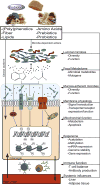Shaping functional gut microbiota using dietary bioactives to reduce colon cancer risk
- PMID: 28676459
- PMCID: PMC5626600
- DOI: 10.1016/j.semcancer.2017.06.009
Shaping functional gut microbiota using dietary bioactives to reduce colon cancer risk
Abstract
Colon cancer is a multifactorial disease associated with a variety of lifestyle factors. Alterations in the gut microbiota and the intestinal metabolome are noted during colon carcinogenesis, implicating them as critical contributors or results of the disease process. Diet is a known determinant of health, and as a modifier of the gut microbiota and its metabolism, a critical element in maintenance of intestinal health. This review summarizes recent evidence demonstrating the role and responses of the intestinal microbiota during colon tumorigenesis and the ability of dietary bioactive compounds and probiotics to impact colon health from the intestinal lumen to the epithelium and systemically. We first describe changes to the intestinal microbiome, metabolome, and epithelium associated with colon carcinogenesis. This is followed by a discussion of recent evidence indicating how specific classes of dietary bioactives, prebiotics, or probiotics affect colon carcinogenesis. Lastly, we briefly address the prospects of using multiple 'omics' techniques to integrate the effects of diet, host, and microbiota on colon tumorigenesis with the goal of more fully appreciating the interconnectedness of these systems and thus, how these approaches can be used to advance personalized nutrition strategies and nutrition research.
Keywords: Bioactives; Colon cancer; Metabolome; Microbiome.
Copyright © 2017 Elsevier Ltd. All rights reserved.
Conflict of interest statement
Conflicts of Interest
The authors have no competing interests.
Figures

References
-
- Ahmed RL, Schmitz KH, Anderson KE, Rosamond WD, Folsom AR. The metabolic syndrome and risk of incident colorectal cancer. Cancer. 2006;107:28–36. - PubMed
-
- Terzic J, Grivennikov S, Karin E, Karin M. Inflammation and colon cancer. Gastroenterology. 2010;138:2101–2114. e2105. - PubMed
-
- Kim JH, Lim YJ, Kim YH, Sung IK, Shim SG, Oh SO, Park SS, Yang S, Son HJ, Rhee PL, et al. Is metabolic syndrome a risk factor for colorectal adenoma? Cancer Epidemiology, Biomarkers and Prevention. 2007;16:1543–1546. - PubMed
Publication types
MeSH terms
Substances
Grants and funding
LinkOut - more resources
Full Text Sources
Other Literature Sources
Molecular Biology Databases

